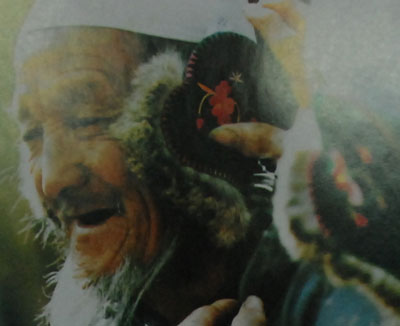
One of the largest minority groups in China is the Hui Nationality. Its population numbers 8.602.978. The largest Hui community is in Ningxia Hui Autonomous Region. A few live in Gansu, Qinghai, Hebei, Henan, Yunnan, Shandong and Xinjiang Autonomous Region.

The Hui people living In the northwest love to wear embroidered earmuffs made of fox skin.
Hui is short for Hui-Hui. The Huis have their roots in the Middle East. In the Tang and Song dynasties, a number of Arabian and Persian merchants came to China and settled down in the southeast coastal areas. They were called "Fanke" at that time. In the 13th century, the Mongolian army launched three Western Expeditions, forcing a large number of Moslems in the Central Asia to immigrate eastward to China. These immigrants, together with Fanke, intermarried with people of the same religion and occupations, and absorbed the customs of the Hans, Mongolians and Uygurs. Later this amalgamated group was called "Huihui".

White head scarves are only used by unmarried woman.
Chinese is the common language of the Huis. However, in religious practices and social contacts, expressions from the Arabian and Persian languages are still in use. Those living in border areas adopted local languages.

Sanzi is a fried wheaten food served during festivals.
The Hui people usually live in close-knit groups, but their communities scatter all parts of the country. In the interior of China, the Huis mainly live together with the Hans, while in bonier areas; they get along with other minority peoples. In most cases, the Hui settlements are built near traffic hubs, which enable the Hui people to develop a prosperous economy and a high culture.

During the Corban Festival, Moslems praying in the Tongxin Mosque.
The dress of the Huis looks almost the same as that of the Hans. The difference is headgear. Hui men wear white, black or brown caps. Women wear long head scarves. In the northwest areas, young women wear green head scarves; middle-aged women wear black or green, while old women wear white.
The Huis are Moslems. Islam played an important role in the forming of the Hui nationality.

Shearing sheep.
The Huis were initially dependent for their livelihood on fanning. Some raise animals or engage in handicraft. The Huis are outstanding businessmen. Their restaurants enjoy high fame.





